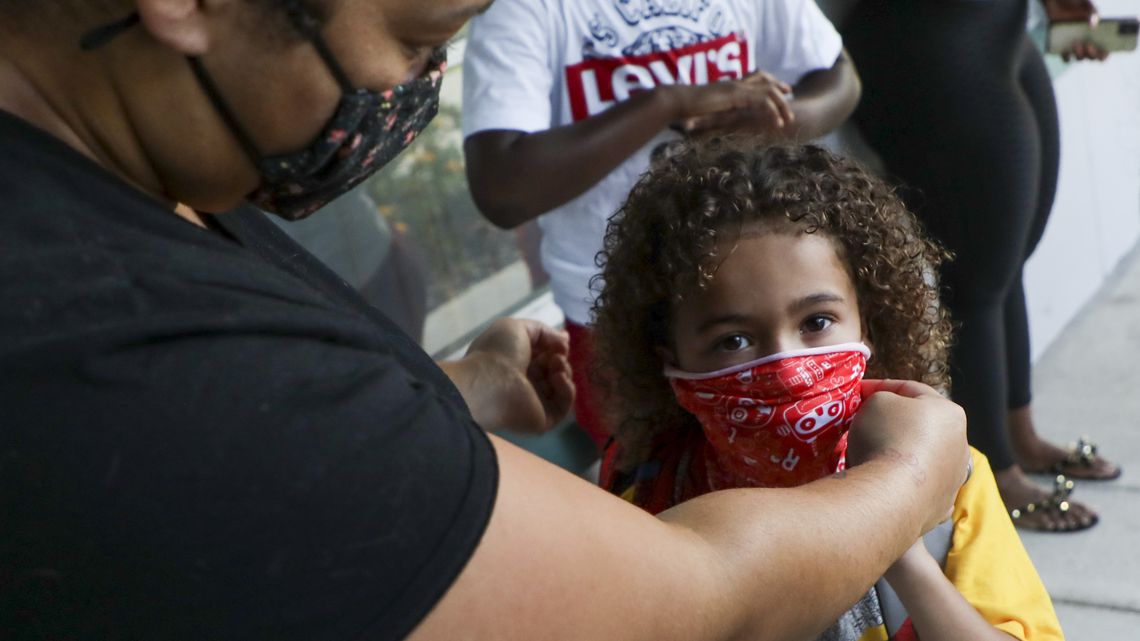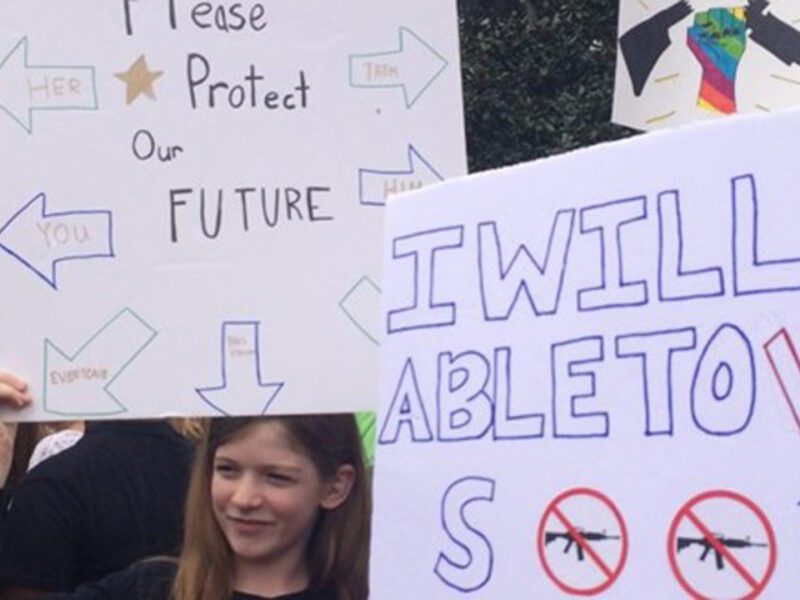
DeSantis’ executive order misleads on lack of scientific support for masks in schools
PolitiFact | Multiple experts told us science shows that mask-wearing is effective in protecting children from COVID-19 and preventing COVID transmission in schools.
Tampa Bay Times | By Victoria Knight, Kaiser Health News | August 11, 2021
On July 30, Florida Gov. Ron DeSantis issued an executive order stating that schools couldn’t mandate that their students wear masks, and that it should be up to parents to decide whether they want their children masked in school buildings. The order also said the state can deny funding to districts that don’t comply.
One part of the order particularly caught our attention because of what it said about masks: “WHEREAS, despite recent Centers for Disease Control and Prevention (CDC) ‘guidance,’ forcing students to wear masks lacks a well-grounded scientific justification; indeed, a Brown University study analyzed COVID-19 data for schools in Florida and found no correlation with mask mandates.”
The executive order came on the heels of the CDC guidelines for reopening K-12 schools, which recommended that everyone age 2 and up should wear masks whether they are vaccinated or not. In addition to universal indoor masking, CDC recommends schools maintain at least 3 feet of physical distance between students within classrooms to reduce transmission risk. When it is not possible to maintain a physical distance of at least 3 feet, such as when schools cannot fully re-open while maintaining these distances, it is especially important to layer multiple other prevention strategies, such as screening testing.
This guidance was issued partly because of the increase in COVID-19 cases due to the delta variant, which is more contagious than other versions of the virus. It was also issued because COVID-19 vaccines have not yet been authorized for use in children under age 12.

During the pandemic, DeSantis, a Republican, has consistently taken positions contrary to public health guidance from experts and said he wants Florida to remain open.
“In Florida, there will be no lockdowns, there will be no school closures, there will be no restrictions and no mandates,” DeSantis said during a speech introducing the executive order, which drew immediate pushback. President Joe Biden criticized his position and a group of Florida parents filed a lawsuit to block the order.
But the state is currently considered a COVID hot spot. New COVID-19 cases jumped to 28,000 on Sunday and total COVID-related hospitalizations to almost 14,000 on Monday — numbers that surpassed previous statewide records. For context, in Florida there were 2,500 new COVID cases and a seven-day average of 229 hospitalizations reported two months earlier, on June 6, before the delta variant surge.
DeSantis’ executive order cites a Brown University study to support his argument that schools can’t mandate masks.
We reached out to DeSantis’ office to confirm the role of that study and to ask if any other research was involved in the development of the executive order.
Press secretary Christina Pushaw replied with an emailed statement reiterating the governor’s position that studies have shown COVID-19′s spread in schools is typically less than within the larger community and that science has yet to substantiate the effectiveness of masks in reducing what she said was “an already very low risk of COVID-19 in children.” She acknowledged that the delta variant has been shown to be more transmissible — which means it could increase children’s risk — “but that is only a working theory as no studies have shown that conclusively.”
That made us wonder about key elements of the executive order — specifically, whether the Brown study indeed illustrated that mask mandates didn’t prevent transmission of COVID-19 and if it’s correct that “forcing students to wear masks lacks a well-grounded scientific justification.”
The Brown study
We reached out to Emily Oster, a professor of economics at Brown University, and the lead author of the study that DeSantis’ order references. Oster became well known during the pandemic for issuing data-driven recommendations on parenting and schooling. Some experts, though, have taken issue with her being an economist and not an epidemiologist.
Oster told us she couldn’t participate in a direct interview about the study, but she sent us this statement:
“We did not consult with Gov. DeSantis on these issues. Our paper is currently a pre-print, undergoing peer review. It relies on data from the 2020-2021 school year, prior to the emergence of the more contagious delta variant. Current CDC guidance, taking into account the current virus situation and all available data on masking, suggests masking for all K-12 students and staff, regardless of vaccination status.”
The study analyzed whether mask mandates in school districts in Florida and other states influenced the number of COVID-19 cases among students and staff members by looking at mitigation strategies as well as COVID-19 case counts. The researchers found that staff rates of COVID-19 were slightly higher in districts without mask mandates, but the difference was not statistically significant. Overall, no correlation was found between mask mandates and COVID cases in students.
But within the study itself, the authors wrote about the limitations of their methods.
For instance, the study looked only at whether mandates existed at particular schools — not at the mask-wearing behavior of students and staffers. The study also didn’t account for mitigation measures that might have been in place in the surrounding community, which would influence case counts.
At the end of the study, the authors offer a conclusion that undermines the executive order: “We would emphasize that in general this literature suggests in-person school can be operated safely with appropriate mitigation, which typically includes universal masking. It would be premature to draw any alternative conclusions about this question based on this preliminary data.”
Justin Lessler, an epidemiology professor at the University of North Carolina, who led a peer-reviewed study that found masking in schools was associated with a significantly reduced risk of COVID-19 transmission, said he didn’t think this Brown study showed any strong conclusions to support the governor’s position.
“I think the lack of correlation with mask mandates at the population level is pretty weak evidence,” Lessler wrote in an email. “Also, mechanistically, it is a little hard to believe masking would not have some effect.”
Other studies on masks in schools
Dr. Lynn Goldman, dean of the Milken Institute of Public Health at George Washington University, said masks are absolutely effective in reducing COVID-19 transmission in children.
“What the science actually shows is that for children ages 2 and above, masks are not only protective but needed,” said Goldman, who is also a pediatrician. Since “those kids who are below the age of 12 cannot yet have the vaccine so they don’t have that layer of protection.”
Goldman also said studies show masking is effective in preventing COVID-19 transmission in schools.
The CDC guidance also cites several CDC-led studies that show the benefits of masking in schools, while independent researchers have shown similar results. Masking was often combined with other efforts to reduce spread, including improved ventilation and filtration systems.

These points counter a claim central to DeSantis’ executive order: that the CDC school-reopening guidance “lacks a well-grounded scientific justification.”
“I think this ‘whereas’ of DeSantis’ executive order is just false, it’s just patently false,” said Dr. Jeffrey Goldhagen, a pediatrics professor at the University of Florida Health in Jacksonville.
What about infection risks for children?
Though studies early in the pandemic did seem to indicate children were less likely to get COVID than adults, current CDC data suggests that no longer seems to be the case.
CDC data through March 2021 shows that COVID-19 infection and symptomatic illness in children ages 5 to 17 was comparable to infection and illness in adults ages 18 to 49. Studies have also shown that even if children have mild or asymptomatic cases of COVID-19 they can spread the disease to adults who may then develop more severe cases — meaning children can be significant vectors of disease.
Children also are susceptible to the delta variant, which is more transmissible than the alpha variant.
Goldhagen said he has already anecdotally heard and seen the spread of the delta variant among children in camps and in schools that have started their semesters.
Pediatric COVID-19 hospitalizations have also been increasing in Florida in the past week, likely due to the delta variant, and there are reports that some children are experiencing serious symptoms. “The increase in the number of patients that we have in our children’s hospital due to COVID-19 has increased 500 percent,” Goldhagen, who is also a pediatrician at Wolfson Children’s Hospital in Jacksonville, told us on Aug. 5.
Our ruling
DeSantis’ July 30 executive order missed the mark with its claim that “forcing students to wear masks lacks a well-grounded scientific justification.”
It also cited a Brown University study as scientific evidence that there is no correlation between mask mandates and reduced COVID-19 spread. However, while that study didn’t show a correlation, its authors noted the study’s limitations and concluded that appropriate mitigation typically includes universal masking. It flatly stated it would be premature to draw other conclusions based on the researchers’ preliminary data. Multiple studies also show masking in schools does have an effect on preventing COVID-19 transmission.
DeSantis’ executive order cherry-picked a study that offers little basis for his position and includes a variety of elements that are not accurate. We rate this False.





